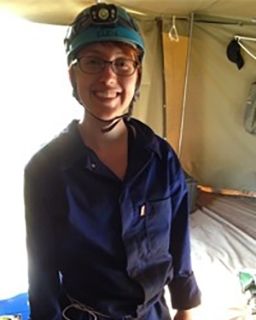Elen
I had a little bit of an Indiana Jones moment. As I was walking down the entry, I had the distinct impression there should have been a rock following me!
It was an unusual advertisement on Facebook that led Elen Feuerriegel to a cave in South Africa, 30 metres under the ground.
The ad was seeking people of small build, with excellent archaeological or paleontological skills, plus caving experience. There can’t be many people in the world who fit that bill, but Elen is one of them.
In the cave, the need for particularly small people became obvious.
“To get in there, it was a 12-metre vertical shaft that you had to drop into,” Elen remembers. “We were moving within 200 metres of a cave system with very tight and very narrow squeezes, including points where it got down to about 18 centimetres in breadth.”
The ad, and Elen’s trip to the cave, was part of the Rising Star Expedition, a National Geographic-sponsored study of 1700 fossilised bones of our ancient human relatives, discovered in a cave system in the Cradle of Humankind World Heritage Site.
A graduate of the Master of Biological Anthropology and current PhD candidate at ANU, Elen was one of only six scientists – all women – who entered the cave.
She says her first journey underground “was a little bit of an Indiana Jones moment. As I was walking down the entry, I had the distinct impression there should have been a rock following me! We couldn’t wear any safety gear going up and down, it was just that tight. We weren’t tied on at all and there was also no natural light whatsoever.”
Elen’s analysis of the fossils uncovered in the cave were published in an issue of Nature dedicated entirely to the expedition. She says her studies at ANU were a critical part of reaching this hugely prestigious achievement.
“My previous archaeological and caving experience set me up for the dig, but what set me up for the subsequent workshop analysing the findings and for the process of writing the papers was my Masters, particularly the osteology courses.”
Elen says it was the reputation of anthropology at ANU that attracted her there, and that the “world-renowned” academics she’s since learnt from have developed her as an anthropologist.
“When you’re dealing with people who have the breadth of knowledge they have, you have to make sure your arguments are absolutely sound before you express them. But that makes you confident in your own ideas.”
As to whether her PhD supervisor at ANU feels intimidated by her publication as a first author in Nature, Elen just laughs. “He has a list of publications that goes into the hundreds, so I don’t think I’m competing with him just yet.”
Interested in Biological Anthropology? Find out about your postgraduate study options in the College of Arts and Social Sciences

Degree
Learn more about Elen's degree: